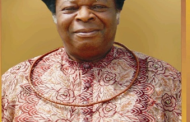Although not a formal piece, this crisp portrait turns out an organised insight into what is happening to all of us, partly as a result of war in Ukraine and partly arising from the structure of the international economy. Coming from one of the six or so Africans running the show in DC think tanking, it is worth reading and reflecting upon!

The author
By Zainab Usman*
The impacts of Russia’s invasion of Ukraine and the associated economic sanctions continue to be felt around the world. While some African oil and gas producers are positioning themselves as alternative energy suppliers to European countries aiming to diversify from Russian natural gas, it is not all rosy. Rising food and fuel prices are some of the immediate inflationary impacts of the war that are being felt in African economies as David McNair explains.
The inflation is compounding pre-existing stresses in these economies, from rising fuel subsidies in Nigeria to growing debt servicing costs in Ghana, as we learnt from the Finance Ministers of these countries at a recent Carnegie Africa event. The tightening monetary policy in the U.S. and Europe could also result in capital outflows from emerging markets including African countries. And lending from China’s policy banks to Africa has dried up recently, plunging to a historic low of just $1.9 billion in 2020. Let’s not forget the $30-$50 billion a year that African countries need, per UN estimates, to invest in adapting and building resilience to climate change.
These are certainly dark clouds that could seriously dampen the post-pandemic economic recovery of many countries. It is no surprise, then, that calls have grown louder for reforming the Bretton-Woods global financial system. A subject hitherto confined to esoteric debates in ivory towers; it featured prominently in the just-concluded World Bank-IMF annual meetings. From U.S. Treasury Secretary Janet Yellen to UNECA Executive Secretary Vera Songwe, the call is clear: we need updated financial tools and trade frameworks to help countries build economic resilience – to climate change, fragmented supply chains and great power rivalry – while being inclusive, equitable and fair to all countries, including those in Africa. Also, “friend-shoring” coined by Janet Yellen is going to be a thing going forward.
Still, it is not all bad news. Google’s much-awaited Equiano sub-sea cable made its first landfall off the coast of West Africa, in Togo, in March. A few weeks later in April, it arrived in Lagos, Nigeria. Concurrently, another sub-sea cable, the Peace Cable linked to Huawei, landed in Africa’s east coast in Kenya. These sub-sea cables promise to bring faster internet speed for the continent and could help boost productivity, contribute to the creation of millions of jobs, and accelerate the continent’s digital transformation (we have a short explainer on this coming soon).
Yet, to reap the benefits of increased digital connectivity in Africa, there must be policy shifts that address a “usage gap” that, Jane Munga explains, is caused by limited penetration of smart phones and high costs of internet data. Our chart of the month illustrates this growing usage gap among populations that are increasingly living in areas covered by mobile broadband.
The author is the Director, Carnegie Africa Program




























